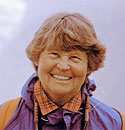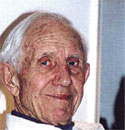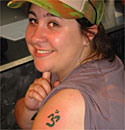|
Ollie Mayer, Woodside, California
former Loma Prieta Chapter conservation chair
 "I started working on conservation issues in San Mateo County in the
'60s when few others seemed interested," says Ollie Mayer. "In those
days there were no trail maps for San Mateo County, and the existing
trails weren't well marked. I took people out to explore the county's
trails, and I encouraged them to take others out, especially children.
Now a lot of the people who came on those hikes with me are Club
leaders." "I started working on conservation issues in San Mateo County in the
'60s when few others seemed interested," says Ollie Mayer. "In those
days there were no trail maps for San Mateo County, and the existing
trails weren't well marked. I took people out to explore the county's
trails, and I encouraged them to take others out, especially children.
Now a lot of the people who came on those hikes with me are Club
leaders."
A 50-year Club member and former Loma Prieta Chapter conservation chair,
Mayer has been instrumental in preserving coastal resources, opposing
illegal logging practices, and extending the hiking trail network in San
Mateo County. One of her most satisfying victories was stopping a
proposed 20-mile, 8-lane freeway along the largely undeveloped coast
south of San Francisco.
Mayer is also especially proud of her leadership in purchasing and
constructing the Sierra Club hiker's hut in Sam MacDonald County Park,
now part of Portola Redwoods State Park. More than 40,000 hikers have
stayed there since the hut opened in 1977.
Now 84 and long-retired from her career as a mechanical engineer – she was
a founder of the Society of Women Engineers – Mayer she has won many
chapter awards, as well as the national Sierra Club's Special
Achievement Award. As fellow Loma Prieta activist Ann Harding puts it:
"She has gone head-to-head with balky legislators and lawyers from San
Mateo to Sacramento to Washington and never stops raising hell for
important environmental causes."
by Tom Valtin
Lloyd Tupling
former Washington Director
 Lloyd Tupling was a young journalist living in Idaho in the 1950s when
the federal government's plans to block his beloved Snake River to
create the Hells Canyon Dam swept him unexpectedly into a life of
environmental advocacy on behalf of the Sierra Club. On July 11, he died
from complications caused by a stroke. Lloyd Tupling was a young journalist living in Idaho in the 1950s when
the federal government's plans to block his beloved Snake River to
create the Hells Canyon Dam swept him unexpectedly into a life of
environmental advocacy on behalf of the Sierra Club. On July 11, he died
from complications caused by a stroke.
Mike McCloskey, the Club's second executive director, says of his
friend, "Tup may have been the most important person in helping
America's environmental movement get beyond rhetoric and get results."
Tupling worked hard to earn such recognition, but always remained
humble. As Washington director of the Sierra Club through the '60s, he
was instrumental in defeating the logging and mining industries'
attempts to gain access to America's protected lands, and in fighting
efforts to weaken environmental regulations. (They were doing that 40
years ago too.)
One of his major victories was preventing Congress from
subsidizing domestic supersonic airplanes, which would have adversely
affected the stratospheric ozone layer. After more than two decades in
Washinton, Tupling retired from full-time work for the Club in 1982,
dedicating himself to volunteer work, including trustee of the
Conservation Trust of Puerto Rico.
Tupling served as a war correspondent in the South Pacific during World
War II, and, during his 1938 honeymoon in Mexico, became the last
journalist to interview Leon Trotsky before his assassination.
Tupling is survived by 3 children, 12 grandchildren, 6 great-
grandchildren, and other family members. The memory of his easygoing
nature, conviction, and commitment to the environment, will also be
remembered by the Sierra Club.
by Brian Vanneman
Meighan Davis, Washington, D.C.
Sierra Student Coalition Director
 "I first got interested in the environment when I was 12 years old and I
went to a Dave Matthews concert in Norfolk, Virginia, where I'm from,"
says Meighan Davis, now 21. "There was an organizer from Greenpeace who
had a booth, and I got hooked. The first thing I did was set up an
environmental group at my middle school that focused on recycling. "I first got interested in the environment when I was 12 years old and I
went to a Dave Matthews concert in Norfolk, Virginia, where I'm from,"
says Meighan Davis, now 21. "There was an organizer from Greenpeace who
had a booth, and I got hooked. The first thing I did was set up an
environmental group at my middle school that focused on recycling.
"In high school I worked on the Home Depot campaign spearheaded by the
Rainforest Action Network, getting Home Depot to stop selling old-growth
lumber. We won! And then we got the rest of the home improvement
industry to follow suit."
In college, as a member of the Sierra Student Coalition, Davis worked to
help get Staples Office Supplies to achieve an average of 30 percent
post-consumer recycled content across all paper products it sells. "And
last November they committed to start phasing out purchases of paper
products from the Canadian boreal forests, the southern United States,
and U.S. national forests," she adds happily.
Davis became SSC national director upon graduating from college this
past June. "I hope to make this the edgiest year in SSC history," she
says. "We want 5,000 new student volunteers to work with Sierra Club
chapters and groups in electoral battleground states.
"I'd encourage all Club activists to work with younger people," Davis
asserts. "We're not just a future generation of environmental
activists – we're the next generation of the Sierra Club!"
by Tom Valtin
Know someone whose story is deserving? Contact us at The Planet, 85
Second St., Second Floor, San Francisco, CA 94105;
planet@sierraclub.org.
Up to Top
|